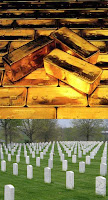Life and death; silver and gold

Forward, the Light Brigade!
Was there a man dismay'd?
Not tho' the soldier knew
Some one had blunder'd.
Theirs not to make reply,
Theirs not to reason why,
Theirs but to do and die.
Into the valley of Death
Rode the six hundred.
When can their glory fade?
O the wild charge they made!
All the world wonder'd.
Honour the charge they made!
Honour the Light Brigade,
Noble six hundred!
-- Alfred Lord Tennyson, 1854
Gold, according to my college art instructor, commands respect.
Our assignment was to create an object of art using jeweler’s tools and techniques. We were allowed leeway in terms of design and materials; but it was clear that those who opted to create their work using gold would have a bit of an edge.
I ended up making a silver pickle fork and my grade reflected a lack of respect on the part of my teacher for both my choice of materials and my level of ability.
I can’t claim to have learned much about art, but my instructor’s prejudice taught me that some objects or enterprises gain gravitas, or extra importance, by virtue of their makeup or nature.
For example, oversize objects are often valued more than those with average specifications; older – particularly ancient artifacts increase in worth with time; items once owned by famous people are prized and goods imported from farther away tend to be considered more precious than those found nearby.
When I studied news writing, I was told to consider qualities including timeliness, proximity, prominence and novelty, but to always keep in mind that the impact, or consequences resulting from events create the most powerful news values.
Among possible impacts, death is trump. Loss of life is the ultimate impact and must nearly always be ranked above all others.
It turns out that war – and terrorism – is prolific providers of wholesale death. Attention, therefore, must be paid. Like gold in the eyes of my professor, death commands respect.
Combine death with prominence (Princess Di, JFK, Lincoln) and you’ve got a story with incredible appeal; multiply the number of deaths (World Trade Center, Hurricane Katrina, Gettysburg) and you have a story that commands much more than attention in the news media, it becomes part of the culture.
And, it occurs to me, that transformation sometimes warps our values. What seems acceptable – even desirable – in the context of war would be considered immoral in nearly any other context.
Since my recent visit to Gettysburg, I’ve had trouble writing. It’s impossible to spend time on that battlefield without experiencing powerful emotions. And, I’ve taken a special interest in this battle – partially because of a video game that reenacts the basic elements, a book (“Killer Angels”) and a movie on the subject. The resulting sense of familiarity added to that mix of emotions.
The fields that contained thousands of bodies in July of 1863 now house hundreds of statues, monuments and other markers. Tons of stone memorialize thousands of dead soldiers.
we can not dedicate -- we can not consecrate -- we can not hallow -- this ground. The brave men, living and dead, who struggled here, have consecrated it, far above our poor power to add or detract.
Oh, yes. When the stakes are life and death, logic and reason go out the window. If so many died, this event had to be important … significant … useful … necessary.
Understanding how it was possible for men to march a mile across open fields while being bombarded by exploding shells and then subjected to thousands of rounds of aimed rifle fire is difficult for 21st century people – at least it’s difficult for me.
It may not be much of a leap from Gettysburg to Baghdad. The random threat of Improvised Explosive Devices isn’t really much different. The horrible carnage experienced in 1863 is matched, at the end of the day, by that going on today in Iraq.
Theirs not to reason why.

1 comment:
You approached Gettysburg with much more feeling than I. I merely studied the sit and tried to envision all those men charging across that open field. I did understand the futility of it, but you were moved so much more than I. Good observations. Thanks.
Chuck
Post a Comment